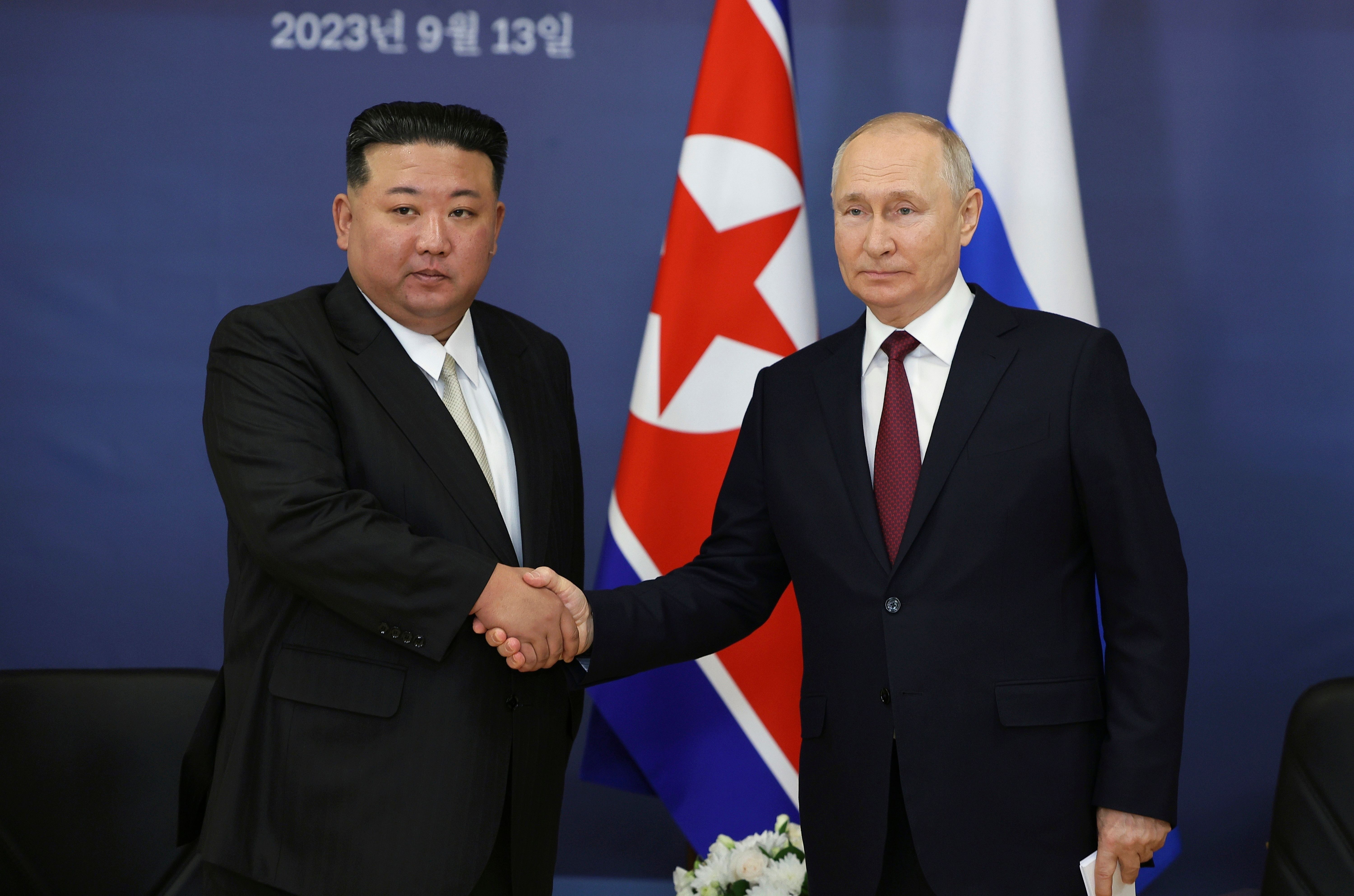Seoul's spy agency says North Korean soldiers captured in Ukraine haven't shown desire to defect
SEOUL, South Korea (AP) — South Korea’s spy agency told lawmakers on Monday that two North Korean soldiers who were captured by Ukrainian forces while fighting alongside Russian forces in Russia’s Kursk border region haven’t expressed a desire to seek asylum in South Korea.

FILE - Russian President Vladimir Putin, right, and North Korean leader Kim Jong Un shake hands during their meeting at the Vostochny cosmodrome outside of Tsiolkovsky, in the far eastern Amur region, Russia on Sept. 13, 2023. (Vladimir Smirnov/Sputnik Kremlin Pool Photo via AP, File)
Ukrainian President Volodymyr Zelenskyy has said he’s willing to hand over the soldiers to North Korea if the country’s authoritarian leader, Kim Jong Un, arranges for an exchange with Ukrainian prisoners of war in Russia. Zelenskyy said one of the North Korean soldiers wishes to stay in Ukraine while the other wants to return to his country, which was consistent with interview videos released by his government. “If Kim Jong Un even remembers these citizens of his and is capable of organizing an exchange for our warriors being held in Russia, we are ready to transfer such soldiers. Undoubtedly there will be more POWs from North Korea,” Zelenskyy said in an address late Sunday. He said in a separate posting on the social media platform X that "there may be other options” for North Korean prisoners who don't wish to go back.
In a closed-door briefing at South Korea’s National Assembly, the National Intelligence Service confirmed its participation in the questioning of the North Korean soldiers by Ukrainian authorities. The agency said the soldiers haven’t expressed a request to resettle in South Korea, according to two lawmakers who attended the meeting.
The agency said it was willing to discuss the matter with Ukrainian authorities if the soldiers eventually do ask to go to South Korea. About 34,000 North Koreans have defected to capitalist rival South Korea to avoid economic hardship and political suppression at home, mostly since the late 1990s.
Koo Byoungsam, spokesperson of South Korea’s Unification Ministry, which handles inter-Korean affairs, said facilitating the asylum of the North Korean soldiers would require “legal reviews, including on international law, and consultations with related nations.”
“There’s nothing we can say at the current stage,” Koo said.
Seoul says about 300 North Korean troops killed in combat
Seoul’s spy agency believes that about 300 North Korean soldiers have died and another 2,700 have been injured while fighting against Ukrainian forces, in what represents North Korea's first involvement in large-scale conflict since the 1950-53 Korean War.
The agency assessed that the North Koreans are struggling to adapt to drones and other elements of modern warfare. They are further disadvantaged by the crude tactics of their Russian commanders, who have thrown them in assault campaigns without providing rear-fire support, according to Lee Seong Kweun, a lawmaker who attended the agency’s briefing.
The agency said memos found on dead North Korean soldiers indicated that they had been ordered to commit suicide before being captured, according to Lee. The agency said one North Korean soldier, facing the threat of being captured by Ukrainian forces, shouted “General Kim Jong Un” and tried to detonate a hand grenade before he was shot and killed.
Zelenskyy confirmed the capture of the North Korean soldiers on Saturday, days after Ukraine, facing a slow Russian onslaught in the east, began pressing new attacks in Kursk to retain ground captured in a lightning incursion in August — the first occupation of Russian territory since World War II.
Moscow’s counterattack has left Ukrainian forces outstretched and demoralized, killing and wounding thousands and retaking more than 40% of the 984 square kilometers (380 square miles) of Kursk that Ukraine had seized.
North Koreans struggle to adapt to Kursk terrain, modern warfare
Moon Seong Mook, a retired South Korean brigadier general, said the high death toll for North Korean soldiers was predictable, as they would not have been sufficiently prepared for an unfamiliar mission in the terrain of the Kursk region, which is vastly different from North Korea’s mountainous landscape.
Another disadvantage for the North Koreans is that they are not conducting independent operations but are being thrust into combat under Russian commanders, possibly struggling with unfamiliar tactics and communication issues due to language barriers, said Moon, who has taken part in numerous military talks with North Korea. The North Korean forces could be operating special surveillance teams to arrest or execute attempted deserters, he said.
“The current battlefield environment, combined with drones and other technologies, have created situations North Korean soldiers have never encountered before,” Moon said. “They are also being deployed in large numbers in wide-open fields, where there is no place to hide, in continuous battles to retake the area, and that seems to be where the casualties are coming from.”
North Korea’s decadeslong financial troubles, which have forced many soldiers to grow their own food or spend long hours deployed in construction and other work to sustain the national economy, could also have impacted the quality of training they receive at home, Moon said.
Still, there are concerns in Seoul that North Korea’s participation in the Ukraine crisis poses a significant threat to South Korea, as North Korean forces may gain crucial combat experience and Russia may provide technology transfers that could enhance North Korea’s nuclear-armed army. __ Associated Press writer Samya Kullab in Kyiv, Ukraine contributed to this report.